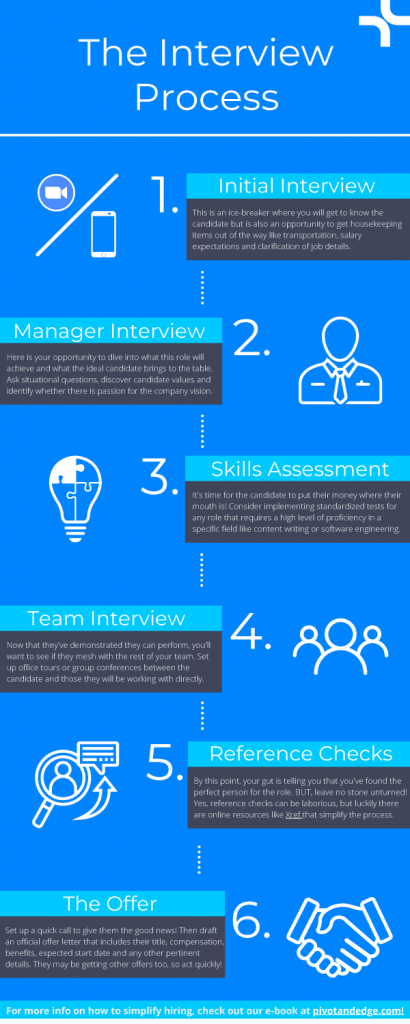Have you ever conducted an interview with a candidate that wasn’t confident, didn’t research the company, didn’t give great answers, had zero questions and ultimately didn’t seem like they had any passion for what you do?
We get it – it’s not a useful way to spend 45 minutes, especially when that time goes into your overall cost per hire. And while ensuring that you’re attracting the right candidates to your job postings will help keep those costs down, you also need to consider the simplicity, scalability and efficiency of your interviewing process. A poorly prepared interviewer can be just as bad for your startup as a poorly prepared candidate.
Now, in a perfect world, the perfect candidate would be found within that first perfect interview after you picked up a perfect resume and it would be a perfectly loose, casual chat about life, aspirations, the best pizza joints in town, with a few templated questions from the internet tacked on for good measure.
Well, that might be achievable if you’re a floor manager hiring a kid for a grocery store chain. But you wouldn’t be reading this article if you were looking for a cart collector, would you?
You are hiring top talent to help you carry your awesome startup or scaleup into the future. You are looking for someone who ‘gets’ your management style, who parallels your company values, who has career goals that align with the position you’re offering and who’s eyes light up when you lay out the three-year plan for your product.
The interview is all about first impressions — for your company and for the candidates. Whether you are interviewing in person or via video, make sure you’re making a good impression by providing them with a positive interview experience that leaves them feeling excited about your company.
Follow the Same Process for Every Interview 
It’s worth asking again: is your company’s interview process chaotic, inconsistent or unprofessional? If so, people are likely to talk about it. Every hiring manager should be trained to conduct interviews in the same way. Keeping a consistent interviewing procedure doesn’t just help you appear more professional; it allows you to scale and refine your interview process as you continue to grow.
In the earliest days of your startup, hiring probably consisted of tapping into your network to see who’s available and asking for help. Once you’ve established your initial team, it’s important to develop a smart, simple and scalable process. Scaling and refining your hiring process allows you to set firmer deadlines and be more confident that the candidates coming through the funnel are of high quality. While this process will vary for every organization, it should consist of three separate stages:
- Interview prep
- The interview (or interviews)
- Decision-making
In your organization, each of these tasks should be assigned ahead of time. Perhaps you have one hiring manager in charge of the entire recruiting process. Or perhaps, you have a team that vets recruits before they get to the interview stage and then have a hiring manager make the final decision. Regardless of whether it’s a solo or team effort, make sure you have a system in place that ensures every applicant is exposed to the same interview process.
Go Into Every Interview Feeling Confident and Organized
It’s not uncommon for interviewees to feel a little rattled when they meet with a hiring manager for the first time. However, if your hiring manager goes into interviews feeling rattled or unsure of themselves, it could lead to an unpleasant experience for everyone at the table and potentially give your business a bad reputation in the job market. Whether you’re conducting interviews yourself or delegating the task to a manager, make sure the interviewer is prepared to speak confidently about the position you’re hiring for and the company’s mission.
Don’t Get Caught Up Explaining the Role
Hiring managers often spend too much time explaining the role during the interview process. While it’s definitely important to outline responsibilities and expectations, it’s important to keep in mind that this information was (or should have been) provided in the job description, which the candidate should have read prior to applying. Instead, briefly touch on the job description and offer the candidate the opportunity to ask any questions they might have. The questions that a candidate poses can give you insight into their skill level, their understanding of the role and how they might fit on the team. This approach is more likely to spark conversation and less likely to result in an interview where you or your hiring manager do all the talking.
When the candidate does ask questions, be ready to answer confidently. Most job seekers are interested in knowing more about the company they could be working for, so be prepared to answer questions about:
- Schedule flexibility
- Pay and benefits
- Corporate culture
- What you like about the company most
- What opportunities there are for growth
Prepare Unique Questions That Encourage Conversation
Are you still asking job seekers these same questions?
“Where do you see yourself in five years?”
“What are your strengths and weaknesses?”
They are uninspired, unoriginal and were likely overstudied by the candidate. If you want an interviewee to think on their feet and give you an authentic answer, you’re going to have to break the mold, so to speak.
Instead of repeating this same formula — which can result in short-term employees who lack passion for what you do – try focusing on unique questions that invoke conversation and anecdotes. That being said, it’s also vital that you avoid asking any questions that are discriminatory or potentially offensive in nature. So, avoid anything that’s likely to make the candidate feel uncomfortable — anything you might ask based on their appearance, personal beliefs, political views etc is best left out. For questions that you feel are important to the company but may ‘ride the line’, you should seek legal counsel and or expert advice on how to ask them while being sensitive.
Sample Questions to Get the Candidate Talking About the Bigger Picture
- If our roles were reversed right now, what questions would you ask me?
- What inspires you to work in this industry?
- If you didn’t have any budgetary restrictions, what innovation would you create to improve this industry?
Sample Questions to Learn More About the Candidate’s Personality Traits
- What would your best friend say is the best thing about you? How about the worst?
- How do you get yourself in the zone?
- Tell me about a time you felt like a hero at work.
Sample Questions to Learn More About the Candidate’s Work-Related Skills
- How do you think our company/product/service can be improved?
- If we hire you, what would you like to accomplish in your first month with us?
- Tell me about a challenge you faced in your previous position and how you solved it.
Keep track of what questions are being asked at each stage as well as the answers your interviewers are getting from them. While some repetition is OK, you need to keep the candidate experience in mind. You don’t want to give a candidate the impression that every stage of the interview is regurgitated from the same piece of paper. It can make the interviewer seem disengaged or disorganized. Plus, if the interviewer at every stage is looking at the responses the candidate gives in previous stages, they can prepare to press further on the really interesting answers or perhaps catch inauthentic candidates contradicting themselves when they are asked similar questions in different ways.
Provide Candidates with Consistent Information
When you’re providing information about your company or about the job during the interview process, make sure the details you offer are consistent with your job posting and reflect your employer brand. If you have more than one manager involved in the interview process, make sure each person is in sync when it comes to the information provided to candidates and new hires.
Take Advantage of Recruiting Technology to Improve Your Interviewing Process
There really is an app for everything! Technology can and will make the recruiting process more efficient. Consider implementing tools such as social media applications, self-serve appointment booking and automated application status updates to enhance the candidate’s experience. Several recruiting software options can help you track applications, create interview scorecards and optimize the recruiting process for every candidate.
Recruitee, a recruitment software that can be operated from your home office or your phone, is an Applicant Tracking System (ATS) sidekick that lets you easily manage your recruitment process without hundreds of daily emails or a storm of spreadsheets. You can launch your recruitment campaign, scale what’s working and align your hiring strategy to your mission – all in one place.
As always — we’re here to help if you need us! We understand, you don’t have the time or resources to sift through hundreds of resume in the hunt for the perfect person or build and craft a fully functioning employer brand. That’s where we come in. Interested in learning more about how we can help build the most effective team for your startup? Contact us today!







